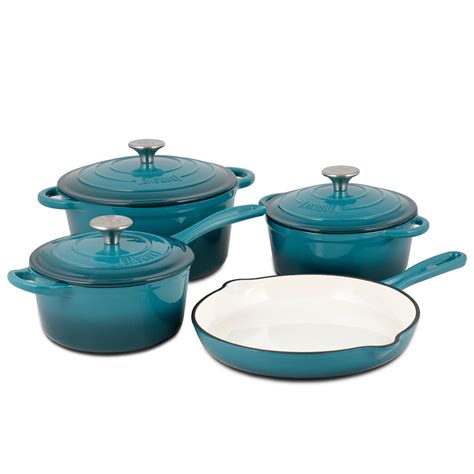A Kitchen Essential for Home Cooks and Gourmets

Cast iron enamel pot sets are an enduring staple in kitchens worldwide, prized for their versatility, durability, and even heat distribution. This comprehensive guide explores the intricacies of cast iron enamel cookware, empowering you to make informed decisions when choosing the perfect set for your culinary adventures.
Unlocking the Benefits of Cast Iron Enamel Pot Sets
Cast iron enamel pot sets offer an array of advantages that make them a must-have in any kitchen:
- Durability: Cast iron is renowned for its exceptional strength and resistance to wear and tear, ensuring years of reliable use.
- Even Heat Distribution: The thick walls of cast iron pots and pans distribute heat evenly throughout the cooking surface, eliminating hot spots and ensuring consistent cooking.
- Heat Retention: Cast iron excels in retaining heat, making it ideal for slow-cooking, braising, and roasting dishes that require consistent temperature.
- Non-Toxic: The enamel coating on cast iron is non-porous and non-reactive, preventing leaching into food and preserving its flavor and nutritional value.
Choosing the Right Cast Iron Enamel Pot Set
Selecting the right cast iron enamel pot set depends on your specific cooking needs and preferences. Consider the following factors:
- Size and Capacity: Determine the number of people you typically cook for and the types of dishes you prepare to select a set that offers the appropriate size and capacity.
- Shape and Design: Choose pots and pans with shapes and designs that suit your cooking style. Saucepans, Dutch ovens, and skillets are versatile options for a wide range of dishes.
- Style and Color: Cast iron enamel pot sets come in a variety of styles and colors to complement any kitchen decor. Consider your personal preferences and the overall aesthetics of your cooking space.
- Brand and Warranty: Opt for a reputable brand that offers a warranty to ensure quality and durability.
Table 1: Common Sizes and Capacities of Cast Iron Enamel Pots and Pans
| Item | Size | Capacity |
|---|---|---|
| Saucepan | 1.5-2 quarts | Ideal for sauces, gravies, and small portions |
| Dutch Oven | 4-6 quarts | Suitable for stews, soups, and casseroles |
| Skillet | 10-12 inches | Versatile for searing, browning, and stir-frying |
| Griddle | 12-14 inches | Perfect for pancakes, grilled sandwiches, and bacon |
Table 2: Heat Distribution and Retention of Cast Iron Enamel Cookware
| Material | Heat Distribution | Heat Retention |
|---|---|---|
| Cast Iron Enamel | Even and Consistent | Excellent |
| Stainless Steel | Variable, Hot Spots Possible | Good |
| Aluminum | Rapid and Uneven | Poor |
Innovative Applications Beyond Traditional Cooking
Cast iron enamel pot sets are not limited to traditional cooking methods. Explore new and innovative applications to expand your culinary repertoire:
- Searing: The high heat retention of cast iron makes it ideal for searing meats and vegetables, creating a flavorful crust while maintaining a juicy interior.
- Baking: Cast iron enamel pots and pans can be used for baking bread, cakes, and pies, providing consistent heat and a crispy crust.
- Grilling: Place a cast iron enamel griddle on your outdoor grill for perfectly seared steaks, grilled vegetables, and more.
- Campsites and Outdoor Cooking: The durability and versatility of cast iron enamel cookware make it a great choice for camping and outdoor cooking.
Table 3: Tips for Maintaining Cast Iron Enamel Cookware
| Maintenance Task | Technique |
|---|---|
| Cleaning | Wash with hot, soapy water and a non-abrasive sponge. Season with oil after each use. |
| Seasoning | Apply a thin layer of oil to the cooking surface and bake at 350°F (175°C) for 1 hour to create a non-stick layer. |
| Rust Prevention | Dry thoroughly after cleaning and apply a thin layer of oil. Store in a dry place to prevent moisture accumulation. |
| Avoid | Avoid using metal utensils or abrasive cleaners, as they can damage the enamel coating. |
Practical Step-by-Step Guide to Using Cast Iron Enamel Cookware
Seasoning:
- Apply a thin layer of oil to the cooking surface.
- Bake at 350°F (175°C) for 1 hour.
- Let cool completely.
Cooking:
- Preheat the cookware over medium heat.
- Add cooking oil or fat as needed.
- Cook food according to your recipe.
- Monitor temperature carefully to prevent burning.
Cleaning:
- Allow the cookware to cool slightly.
- Wash with hot, soapy water and a non-abrasive sponge.
- Rinse thoroughly and dry with a clean towel.
Table 4: Troubleshooting Common Issues with Cast Iron Enamel cookware
| Problem | Possible Cause | Solution |
|---|---|---|
| Food Sticks | Insufficient seasoning | Season the cookware more frequently. |
| Rust | Moisture accumulation | Dry thoroughly after cleaning and apply a thin layer of oil. |
| Enamel Chips | Abrasive cleaning | Avoid using metal utensils or abrasive cleaners. |
| Warping | Overheating | Cook over medium heat and avoid sudden temperature changes. |
Conclusion
Cast iron enamel pot sets are a timeless investment that can enhance your cooking experience for years to come. By understanding the benefits, selecting the right set, and following proper maintenance and usage techniques, you can unlock the full potential of this versatile cookware. Embrace the versatility and durability of cast iron enamel pots and pans, and elevate your culinary creations to new heights.
